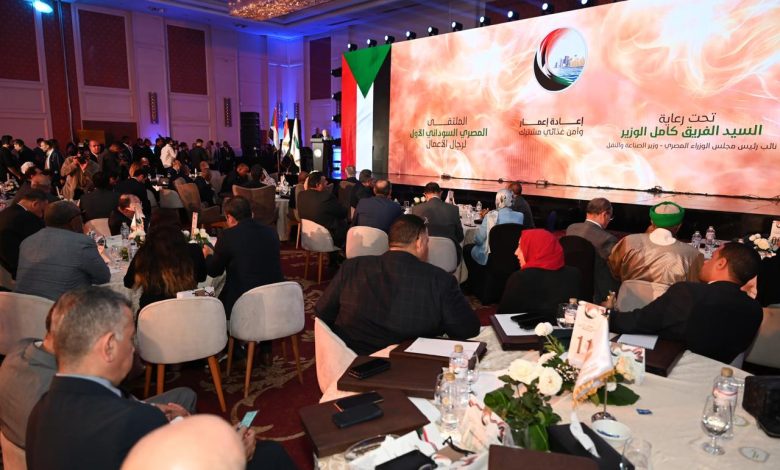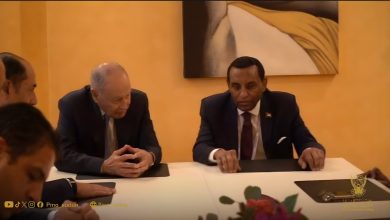
Sudan Events – Agencies
Over the course of more than seven hours, Egyptian and Sudanese officials, alongside business leaders, convened at the First Sudanese-Egyptian Business Forum. Organized by the Egyptian-Sudanese Development and Investment Company in collaboration with the Sudanese Embassy in Egypt, the forum focused on critical issues such as reconstruction and food security. This initiative represents a vital step forward in rescuing Sudan from the grips of a nearly two-year-long war.
A large crowd from the private sectors of both nations, alongside media representatives, filled the hall to capacity. Their aim was to lay the groundwork for economic integration through shared opportunities and mutual investment.
Strengthening Relations
Alaa Nagy, the General Manager of the Egyptian-Sudanese Development and Investment Company, emphasized that the forum marks a significant step in bolstering economic ties between Egypt and Sudan. Nagy stated that reconstruction necessitates collaborative efforts and enhanced partnerships to rebuild Sudan and foster joint investments.
He underscored the importance of developing cooperation, opening new horizons, and strengthening investment opportunities. He expressed his hopes for mutual investments that align with the shared interests of both countries.
On behalf of Sudanese business leaders, Saud Al-Barir proposed creating a joint financing portfolio between Egypt and Sudan to facilitate partnerships. He also suggested mechanisms for funding these ventures through banking institutions, immediate establishment of free zones, and removing barriers to partnerships. Additionally, he highlighted the need for developing banking transfer systems to manage financial flows for reconstruction.
Al-Barir called for tax and customs exemptions for reconstruction projects and urged the Egyptian government to convene a donor conference to support Sudan’s rebuilding efforts. He also appealed to Egyptian companies to contribute to rehabilitating Sudan’s infrastructure.
From the Egyptian side, business leader Ahmed El-Sewedy emphasized the unique bond between the two countries. Drawing on his company’s experience of operating six factories in Sudan, El-Sewedy said, “We view Sudan as our own country.” He stressed the importance of integrating resources, particularly in agriculture, where Egypt’s expertise could be pivotal.
El-Sewedy advocated for enhancing electricity connectivity between the nations, given its significance to production sectors. He also called for identifying viable opportunities and projects to ensure readiness for post-war reconstruction.
Business tycoon Naguib Sawiris echoed El-Sewedy’s sentiments, highlighting Sudan’s extraordinary natural resources and opportunities. Sawiris called for short- and long-term plans to overcome the ongoing Sudanese crisis, which, he lamented, benefits no one.
Trade Continuity
Sudanese Ambassador to Egypt, General Emad Mustafa Adawi, noted that trade volumes between Egypt and Sudan have remained stable despite the ongoing war. Adawi pointed out that trade exchange remained consistent in 2022-2023, as did capital flows.
He explained that the war has actually prompted greater collaboration, creating an impetus for deeper economic integration between the two nations. Adawi stressed that Sudan is preparing for the post-war phase and emphasized the importance of collaborative efforts to advance shared economic interests.
Sudan’s Minister of Trade, Omar Banfeer, underscored the need to strengthen local components in both nations to bolster partnerships and cross-border trade. He emphasized the importance of joint efforts to serve the mutual interests and common destiny of both peoples.
“Both nations occupy strategic locations that can drive significant developmental strides,” Banfeer said, adding that economic integration is a priority for the next phase, particularly in tourism and real estate development.
Overcoming Challenges
Egypt’s Minister of Supply and Internal Trade, Dr. Sherif Farouk, urged business leaders to build a robust foundation for developing sectors with high potential. He emphasized Egypt’s ambition to become a regional grain storage hub in Africa and noted that Egypt’s advancements in infrastructure could play a pivotal role in Sudan’s reconstruction.
Meanwhile, Egyptian Deputy Prime Minister and Minister of Industry and Transport, Kamel El-Wazir, reaffirmed Egypt’s commitment to supporting Arab nations, particularly during crises.
El-Wazir highlighted Egypt’s dedication to resolving Arab conflicts, guided by President Abdel Fattah El-Sisi’s vision. He stressed that Egypt feels a profound responsibility to assist its neighbors and sees regional stability as a top priority.
He explained that collaboration and joint action are essential to overcoming challenges and seizing opportunities, fostering continuous communication with Sudan. This approach, he asserted, could lead to frameworks that strengthen bilateral relations, particularly in trade and investment.
El-Wazir also outlined President El-Sisi’s directives to position Egypt as a regional hub for transport, logistics, and transit trade. The Ministry of Transport has pursued strategic objectives, including developing international logistical corridors that connect industrial, agricultural, and mining production hubs to seaports via fast and secure transportation networks. Plans are also underway to establish 32 dry ports and logistics zones across Egypt.
“Merged strengths of the Egyptian and Sudanese economies can significantly benefit trade exchange,” El-Wazir concluded.
Reported by Al-Mohaqiq News.



